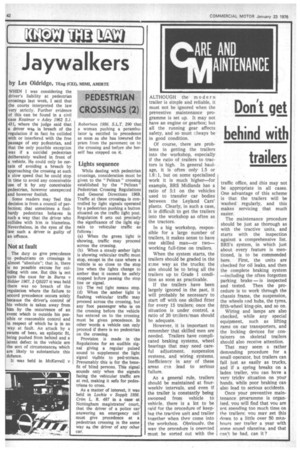ARE AND AINTENANCE
Page 44

If you've noticed an error in this article please click here to report it so we can fix it.
Don't get behind with trailers
ALTHOUGH the modern trailer is simple and reliable, it must not be ignored when the preventive maintenance programme is set up. It may not have an engine or gearbox; but all the running gear affects safety, and so must always be in good condition.
Of course, there are problems in getting the trailers into the workshop, especially if the ratio of trailers to tractors is high. In general haul age, it is often only 1.5 or 1.6 :1, but on some specialised work it •is much higher—for example, BRS Midlands has a ratio of 5:1 on the vehicles used to transfer car bodies between the Leyland Cars' plants. Clearly, in such a case, it is difficult to get the trailers into the workshop as often as the tractors.
In a big workshop, responsible for a large number of trailers, it makes sense to have one skilled man—or two— working full-time on trailers.
When the system starts, the trailers should be graded in the sn_rne way as the trucks; the aim should be to bring all the trailers up to Grade 1 condition as soon as practicable.
If the trailers have been largely ignored in the past, it will probably be necessary to start off with one skilled fitter for every 15 trailers; once the situation is under control, a ratio of 20 trailers/man should be adequate.
However, it is important to remember that skilled men are needed. Trailers have compli cated braking systems, wheel bearings that may need care ful adjustment, suspension systems, and wiring systems. Inefficiency in any of these areas c-in lead to serious failure.
As a general rule, trailers should be maintained at fourweekly intervals, and even if the trailer is constantly being swonned from vehicle to vehicle, there is a lot to be raid for the procedure of keep ing the tractive unit and trailer together when they come into the workshop. Obviously, the way the procedure is operated must be sorted out with the traffic office, and this may not be appropriate in all cases. One advantage of this scheme is that the trailers will be washed regularly, and this makes servicing that much easier.
The maintenance procedure should be just as thorough as• with the tractive units, and starts with the inspection against a comprehensive list. BRS's system, in which just about every feature is mentioned, is to be commended here. First, the units are checked for oil leaks, and then the complete braking system —including the often forgotten parking brake — is inspected and tested. Then the procedure is to work through the chassis frame, the suspension, the wheels and hubs, the tyres, fifth-wheel king-pin, and so on.
Wiring and lamps are also checked, while any special equipment, such as lifting rams on car transporters, and the locking devices for containers on skeletal trailers should also receive attention.
That may seem a rather demanding procedure for a small operator, but trailers can fail just as easily as trucks, and if a spring breaks on a laden trailer, you can have a very tricky situation on your hands, while poor braking can also lead to serious accidents.
Once your preventive maintenance programme is organ-' Ned, you will find that you are not sDending too much time on the trailers; you may get this down to a little over 50 m4nhours Der trailer a year with some sound planning. and that can't be bad, can it ?
















































































